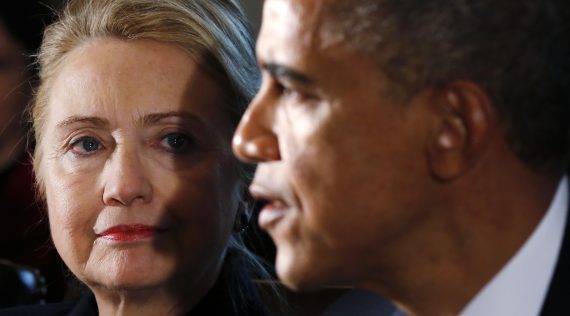What “Third Term Curse?”
Some have argued that there is an historical bias against political parties holding on to the White House for more than two terms. As with most commonly held ideas, that simply isn't true.
One of the arguments that political pundits have been repeating quite a lot in discussing the probable Presidential candidacy of Hillary Clinton is the so-called “third term curse.” In essence, this comes down to the idea that American voters are reluctant to give the same political party another turn at the White House after a two term Presidency. At least based on recent experience, there seems to be some merit to that idea. The two terms of Richard Nixon and Gerald Ford were followed by Jimmy Carter; Clinton’s two terms were followed by Bush; and Bush’s two terms were followed by Obama. Going by these examples, and the one recent counter-example of George H.W. Bush succeeding Ronald Reagan, it would seem logical to believe that the odds are against a Democrat succeeding Barack Obama in 2016. As Jeff Greenfield notes at The Daily Beast, though, the supposed “third term curse” is mostly just a myth:
For much of our political history, the “third term” curse was non-existent. During the Republican ascendancy that began with Lincoln’s election in 1860, the party won six straight elections (although it did take some highly sketchy maneuvering in 1876). Later, the White House passed from McKinley to Theodore Roosevelt to Taft, and then from Harding to Coolidge to Hoover. FDR and Harry Truman combined to keep the Presidency in Democratic hands for twenty consecutive years. (Coincidentally or not, in all of these streaks, the death of a President brought a new occupant to the White House.)
The “reluctance” Harwood points to didn’t really begin until 1960. As he puts it: “The combination of fatigue with the incumbent party and rejuvenation by its opposition helped stymie Richard M. Nixon when he sought to succeed Dwight D. Eisenhower in 1960 and Hubert H. Humphrey when he tried to follow Lyndon B. Johnson eight years later. Al Gore lost in 2000 despite President Clinton’s high approval rating and economic record.” In this last half-century plus, only George H.W. Bush was able to win a third term for his party. (Note: in every case, the nominee was the sitting vice-president — a stark reminder of how much more important that office has become in recent decades.)
As Greenfield goes on to note, each of the recent examples that people who put forward this idea is distinguishable by the unique characteristics at play both during the two preceding Administrations, and at the time of the third election. The Kennedy/Nixon election in 1960, for example, was incredibly close and by 1968 the nation, and most importantly the Democratic coalition was torn apart by the Vietnam War. And even then, Nixon only beat Hubert Humphrey by roughly 500,000 popular votes and probably would have lost the Electoral College vote if George Wallace had not been in the race. In the case of Nixon and Ford, of course, we saw both the first President who was ever forced to resign and the first President who had never actually stood for election prior to taking office and even with those factors, President Ford came within 30 Electoral Votes of winning election. The Bush/Gore election in 2000 was the closest in American history, so it’s difficult to say that it involved any real rejection of the record of the Clinton Administration. Of all the elections following a two-term Presidency since 1960, perhaps only the 2008 election could be said to have been a real rejection of the legacy of the incumbent President. In that case, between resentments over the Iraq War and the growing financial crisis, President Bush’s approval numbers were so low that its unlikely any Republican could have won that year. Other than that election, though, there really isn’t much recent historical evidence for the idea that voters are reluctant to keep the same party in power under the right circumstances.
To some degree, the so-called “third term curse” is similar to an argument that some people were making prior to the 2012 election regarding why it was unlikely that President Obama would be re-elected. As these people correctly pointed out, the United States had not seen three two-term Presidents in succession since Presidents Jefferson, Madison, and Monroe served between 1801 and 1825. Given this “fact,” some people argued that it was unlikely that President Obama would be elected to a second term in the wake of the successive two-term Presidencies of Presidents Clinton and Bush. As it turned out, of course, this supposedly immutable law of history, which in retrospect wasn’t really a law to begin with so much as it was an historical accident and the fact that we are dealing with a small sample size, didn’t really have any influence at all over the outcome of the election that year. Similarly, while it is entirely possible that Hillary Clinton, or whomever the Democratic nominee might be if she decides not to run or somehow ends up losing the nomination fight, could lose the General Election in 2016, if it happens it won’t be because of some “third term curse.” It will be because of the unique circumstances of that election.






Well…it’s a curse for the opposition party.
How do you explain FDR? Did the article mention anything about a polio curse?
Ob xkcd:
http://xkcd.com/1122/
You know, Andrew Johnson hates to be ignored.
@PD Shaw:
Technically Johnson was not elected as a Republican in 1864, though, And he never ran for election in his own right.
@Doug, Johnson was a Democrat, who completed a Republican’s second term. If he had been re-elected (hard to imagine), nobody would talk about him completing Lincoln’s third-term. It’s just an odd set of events where there was not a third-term possibility because of a national unity party and Lincoln’s death.
There is no Third Term Curse, but there is voter fatigue. I can see that here in Brazil, voter fatigue with the Concertacion that propelled Sebastian Pinera to the Presidency of Chile in 2009, that can be noted in many elections in the US.
The bigger issue today that negates this idea is the lack of a responsible, engaged, patriotic and loyal opposition party.
Republicans have simply lost their way and in many districts must suppress the voter’s knowledge of their policies – or even their actual vote – in order to win anything like a majority of voters to their side.
I’d much rather be in the Democrat’s position where openly and honestly letting constituents know the party’s policy preferences will win the day.
The pundits yapping about a third-term curse are the same ones who kept going on about how it was impossible for a sitting senator to be elected president in 2007. Oddly, once two sitting senators won their parties’ nominations, they conveniently forgot they’d been saying this.
James Joyner and I were debating this a couple of weeks ago. What I’d add now is that, to me, it reveals the stunning superficialty of most post-election analysis. There is a common mistake I like to call the Gore Fallacy, defined as trying to draw general conclusions about presidential losers using Al Gore as one of your examples. You wouldn’t believe how many pundits across the political spectrum commit this basic error.
But the Gore Fallacy is really just a reductio ad absurdum to a much broader, deeper problem, which is the tendency to view all elections strictly in binary terms: either you win or you lose. It doesn’t matter whether you won by a hair or by a landslide, or even whether you won the popular vote; as long as you managed to reach the White House, profound conclusions can automatically be drawn about your campaigning abilities and the popularity of your agenda.
It’s illustrated nicely by a story I heard about the aftermath of the 1960 election. (Whether the story is true or not isn’t the point.) Someone told Bobby Kennedy that he was a genius. Kennedy replied, “Change 60,000 votes and I’m a bum.”
Lyndon Johnson did not run for a second term, let alone a third. I think that he could have won both. If Humphrey had one more week he would have won in ’68.